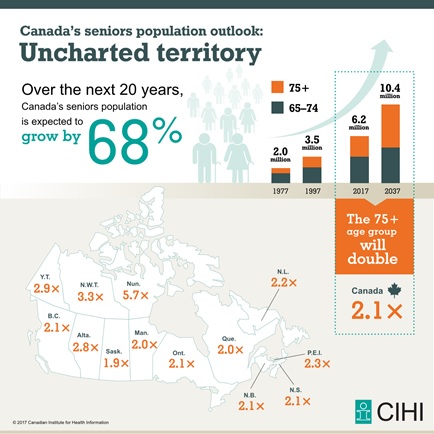By Riley Denver
Canada is in the middle of a demographic shift that will impact health system decisions for the foreseeable future.
For the first time, seniors outnumber children and over the next 20 years, growth in the older seniors’ population (age 75 and older) is expected to accelerate and to double in size.
Health systems are already experiencing significant pressure in all sectors as they respond to the needs of seniors — including a desire for independence and to remain in their homes as long as possible.
Faced with this changing demographic landscape, Canada’s health system has been presented with an important question: How can we best meet the unique needs of this growing population?
Seniors in transition
Seniors in Transition: Exploring Pathways Across the Care Continuum – a report from the Canadian Institute for Health Information (CIHI) – is a multi-year study of more than 59,000 seniors in Canada.
The focus of the report is to better understand how Canada’s seniors transition from living independently to receiving continuing care services, and what factors influence their transition into residential care.
The study found that as many as 1 in 5 seniors admitted to residential care might have been able to remain at home with appropriate support. This finding underlines the need for additional community-based supports to help seniors maintain their independence as long as possible.
Admitting seniors to residential care who may have been able to be supported in home care can have undesirable consequences. It can result in a longer stay in residential care, a negative impact on patient outcomes and potential displacement of higher-needs individuals.
There are seniors who enter residential care with care needs that are similar to those of seniors who are typically supported in the community. Factors that influence whether someone enters residential care include:
- The need for physical assistance
- Cognitive impairment
- Wandering behaviours
- Living alone
- Having a caregiver who is unable to continue providing care
 The findings also showed that seniors whose needs were assessed in hospital were over 6 times more likely to enter residential care than those assessed in the community. However, seniors assessed in hospital may have higher needs than those assessed in the community, explaining their higher priority for admission to residential care.
The findings also showed that seniors whose needs were assessed in hospital were over 6 times more likely to enter residential care than those assessed in the community. However, seniors assessed in hospital may have higher needs than those assessed in the community, explaining their higher priority for admission to residential care.
“What we regularly see now is the need to consider a patient’s pre-hospital functioning when developing care plans,” said Steve Atkinson, CIHI’s Manager, Analytics and Research Projects. “This helps hospital staff understand how patients function in their normal day-to-day lives and allows them to make treatment plans that enable patients to return to their normal living arrangements.”
To help people better understand the populations served by home care and residential care in selected health regions, CIHI developed an interactive online tool that allows users to observe characteristics of seniors’ populations over time and across care settings, at the health region level.
What’s next?
As the proportion of older seniors in Canada continues to climb, the number of people who will require care is expected to grow.
Ensuring there is capacity to meet the pending demand of a growing population of seniors means transforming the way care is provided.
Making sure that health services match the needs of the population, and that current beds and home health services are used appropriately, may allow health systems to maximize the efficient use of their resources.
There are many innovative approaches being introduced across the country designed to meet client and caregiver needs in the home, often featuring improved integration across health care systems and leveraging new technologies.
The challenge for health system decision-makers, care providers and planners going forward is exploring ways to expedite their implementation in order to address the future needs of the continuing care sector.
Riley Denver is the Communications Specialist at The Canadian Institute for Health Information (CIHI).



Comments are closed.